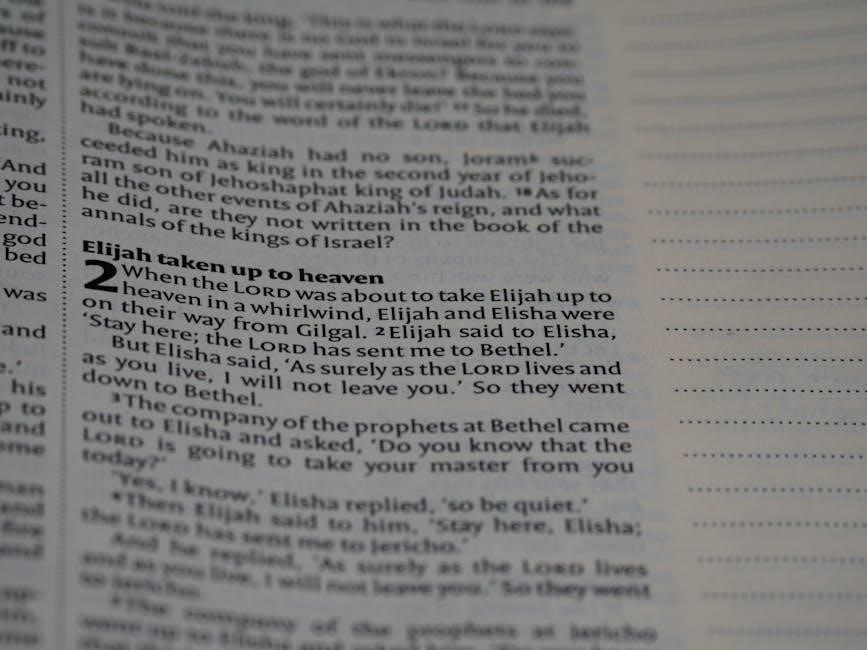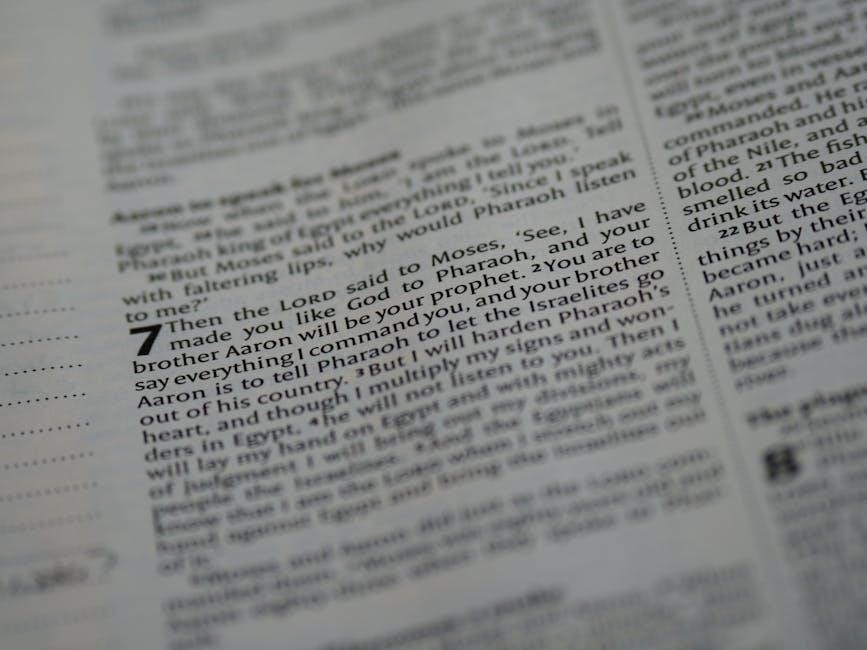
prophets of the bible in chronological order pdf
The prophets of the Bible were divinely appointed messengers who communicated God’s will to humanity, serving as moral and spiritual guides․ Studying them chronologically reveals the progression of God’s redemptive plan, emphasizing themes of judgment, repentance, and ultimate redemption through Jesus Christ, the climax of prophetic fulfillment․
Definition and Role of Prophets in the Bible
Prophets in the Bible were divinely appointed messengers who spoke on behalf of God, communicating His will, warnings, and promises to humanity․ Their role was multifaceted, including calling people to repentance, foreseeing future events, and guiding individuals and nations morally and spiritually․ While prophets were often associated with predicting the future, their primary function was to uphold God’s justice and righteousness․ They acted as intermediaries between God and humanity, addressing both individual and collective sins․ The Bible distinguishes prophets from seers, though their roles overlapped․ Prophets were not limited to predicting events but were also called to interpret God’s Word and apply it to the lives of His people, making their ministries pivotal in shaping Israel’s history and spiritual identity․
Importance of Studying Prophets Chronologically
Studying the prophets of the Bible in chronological order provides a clearer understanding of the progression of God’s plan and the development of His message over time․ By arranging their ministries chronologically, readers can see how prophecies build upon one another, offering insight into the historical and cultural contexts that shaped their messages․ This approach helps identify recurring themes, such as redemption, judgment, and restoration, which are central to God’s redemptive plan․ Chronological study also highlights the fulfillment of earlier prophecies in later events, particularly in the life and ministry of Jesus Christ․ This method enhances spiritual growth by revealing the coherence and unity of Scripture, making it easier to apply biblical truths to modern life․

Early Prophets of the Bible
The early prophets of the Bible, such as Moses, Elijah, and Elisha, laid the foundation for God’s communication with His people, setting the stage for future prophetic ministries․

Moses as a Prophet and Leader
Moses, one of the most prominent figures in the Bible, served as both a prophet and a leader․ He received divine revelations, such as the Ten Commandments, and communicated God’s will to the Israelites․ Moses’ leadership was crucial during the Exodus, guiding the people out of Egyptian bondage and through the wilderness․ His prophetic role emphasized obedience to God’s laws and the promise of a future Messiah․ Moses’ humility and faithfulness set a standard for prophetic ministry, and his legacy as a prophet and leader laid the foundation for Israel’s identity and spiritual journey․ His life and teachings remain central to understanding the progression of God’s redemptive plan, ultimately pointing to Jesus Christ․
Elijah and Elisha: Their Prophetic Ministry
Elijah and Elisha were prominent prophets during the Kingdom of Israel, known for their bold confrontations with idolatry and their miraculous deeds․ Elijah famously challenged King Ahab and Queen Jezebel over their worship of Baal, culminating in the dramatic showdown on Mount Carmel․ Elisha, Elijah’s successor, inherited a double portion of his spirit and performed numerous miracles, including healing the Shunammite woman’s son and Naaman the leper․ Their ministries emphasized God’s power and justice, calling Israel back to fidelity․ Elijah’s departure in a fiery chariot marked the end of his earthly ministry, while Elisha’s prophetic work expanded Israel’s influence․ Together, their prophetic authority and miracles laid a foundation for future prophets and pointed to God’s ultimate redemption through the Messiah․
Prophets of the Divided Kingdom

This period saw prophets like Isaiah, Jeremiah, and Ezekiel, who addressed both kingdoms of Israel and Judah during times of crisis, emphasizing God’s justice and mercy chronologically․
Isaiah: Prophecies of Judgment and Redemption
Isaiah, a prominent prophet of the eighth century BCE, delivered messages of both judgment and redemption to Judah․ His prophecies emphasized God’s holiness and the need for repentance, addressing social injustices and idolatry․ Isaiah foresaw the fall of Jerusalem and the eventual restoration of Israel, highlighting God’s faithfulness․ His visions, such as the suffering servant in Isaiah 53, pointed to a future Messiah who would bear humanity’s sins․ Isaiah’s ministry bridged the gap between judgment and redemption, offering hope for a glorious future under God’s reign․ His teachings remain central to biblical theology, illustrating God’s justice and mercy in a chronologically unfolding plan of salvation․
Jeremiah: The Weeping Prophet
Jeremiah, known as the “Weeping Prophet,” ministered during the seventh century BCE, a time of great turmoil for Judah․ Called by God as a youth, Jeremiah confronted widespread idolatry and moral decay, urging repentance to avoid divine judgment․ His prophecies often expressed deep emotional pain over Judah’s rebellion, earning him the nickname “Weeping Prophet․” Jeremiah foretold the fall of Jerusalem to the Babylonians and the ensuing exile, yet he also emphasized God’s promise of restoration․ His teachings stressed the importance of an inward covenant with God, contrasting with the outward rituals of his time․ Despite persecution, Jeremiah remained faithful, leaving a legacy of unwavering commitment to God’s truth and a vision of future redemption․
Ezekiel: Visions and Call to Repentance
Ezekiel, a priest-turned-prophet, received his call during the Babylonian exile, around 593 BCE․ His ministry was characterized by vivid, symbolic visions, such as the whirlwind and four living creatures, which emphasized God’s presence and judgment․ Ezekiel’s prophecies often involved dramatic acts, like lying on his side for 390 days to symbolize Israel’s siege, to convey divine messages․ His teachings balanced judgment with hope, notably in the vision of the valley of dry bones, symbolizing Israel’s future restoration․ Ezekiel’s unique prophetic methods and apocalyptic imagery underscored the urgency of repentance and the promise of divine redemption, making him a pivotal figure in the biblical narrative of judgment and renewal․
Post-Exilic Prophets
Post-exilic prophets, such as Haggai, Zechariah, and Malachi, ministered after the Babylonian exile, urging Israel to rebuild the Temple and renew their spiritual commitment to God․
Haggai, Zechariah, and Malachi: Rebuilding and Renewal
Haggai, Zechariah, and Malachi were post-exilic prophets who played crucial roles in Israel’s spiritual and physical restoration․ Haggai urged the people to rebuild the Temple, emphasizing obedience and God’s presence․ Zechariah, through visionary prophetic messages, encouraged repentance and hope for a restored Jerusalem․ Malachi, the final Old Testament prophet, called for a return to true worship and faithfulness, addressing issues like corrupt practices and spiritual apathy․ Their ministries marked a transitional period, bridging the gap between the exile and the New Testament era, emphasizing renewal and preparation for the coming Messiah․
Prophets in the New Testament
The New Testament highlights John the Baptist as the final Old Testament prophet and Jesus Christ as the ultimate fulfillment of prophetic ministry, embodying God’s revelation․
John the Baptist: The Final Old Testament Prophet

John the Baptist is recognized as the final prophet of the Old Testament era, bridging the gap between the Old and New Testaments․ His ministry focused on preparing humanity for the coming Messiah, emphasizing repentance and spiritual purification through baptism․ John’s role was both symbolic and practical, as he baptized Jesus, marking the beginning of Christ’s public ministry․ Despite his humble demeanor, John’s message was powerful, calling people to moral accountability and a return to God․ His eventual martyrdom underscored the challenges faced by prophets in conveying God’s message․ John’s legacy lies in his unwavering commitment to truth and his pivotal role in introducing Jesus as the Savior of the world․
Jesus Christ as the Ultimate Prophet
Jesus Christ is often regarded as the ultimate prophet in the Bible, fulfilling the prophecies of the Old Testament and embodying God’s final revelation to humanity․ Unlike previous prophets, Jesus not only spoke God’s words but also demonstrated His divine nature through miracles and teachings․ His ministry emphasized love, forgiveness, and redemption, culminating in His sacrificial death and resurrection․ Jesus’ prophetic role was unique, as He revealed the fullness of God’s character and plan for salvation․ His teachings transcended the era of the Old Testament prophets, ushering in the New Covenant and establishing the foundation of Christianity․ Through His life and resurrection, Jesus demonstrated His authority as both the Prophet and the Messiah, fulfilling the expectations of previous prophets and offering eternal hope to all humanity․
The biblical prophets collectively reveal God’s redemptive plan, emphasizing themes of judgment, repentance, and ultimate redemption through Jesus Christ, whose legacy continues to inspire modern Christianity and guide believers today․
The Legacy of Biblical Prophets in Modern Christianity
The prophets of the Bible continue to hold profound significance in modern Christianity, offering timeless lessons on morality, justice, and faith․ Their teachings emphasize God’s love, justice, and mercy, guiding believers in understanding His divine plan․ The prophetic call to repentance and renewal resonates today, urging Christians to live faithfully and compassionately․ The legacy of these prophets is evident in the church’s commitment to social justice and evangelism․ Their words inspire personal reflection, communal worship, and missionary endeavors․ By studying their chronology and messages, modern Christians gain deeper insights into God’s will and redemptive purpose, fostering a stronger connection to their faith and spiritual heritage․